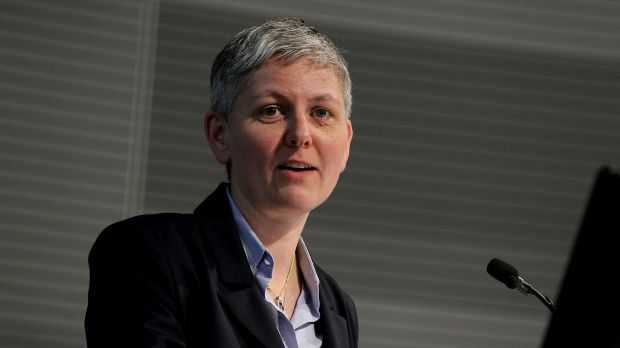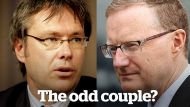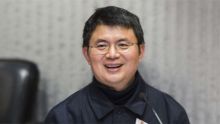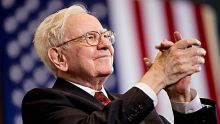Reserve Bank of Australia Governor Philip Lowe prides himself on trying to fully answer questions levelled at him in public. It turned out to be a query from his family that flummoxed him.
Lowe's 15-year-old daughter came home from school with a burning question that would leave an impression on the RBA chief: what was he doing to make sure women have equal chances at the central bank?
More BusinessDay Videos
Tintin and the rocker: meet the incoming RBA bosses
Philip Lowe and Guy Debelle are the unlikely duo taking the reins at the Reserve Bank of Australia.
"I didn't have a really good answer at first and she said 'that's not good enough,"' 55-year-old Lowe said in his first interview after taking over as governor four months ago. "So that made me think about where we're going."
Since then, Lowe has promoted women to two of three RBA assistant governor roles focused on monetary policy -- the first time females have held such positions. The institution has struggled to lift its share of women managers to a third -- mirroring a similar challenge throughout Australia's workforce.
An education problem
But Lowe's efforts to further gender equality face a problem: there's a dire shortage of women studying economics and finance. For economics, the recent ratio for schools in New South Wales was one for every two boys, according to government data. The upshot is that the competition for talented women is intensifying.
"At the end of the day, we can't all achieve our objectives unless there are more women studying economics," Lowe said in the interview, in which he didn't discuss monetary policy. "Companies can compete with one another, and those particular women will do very well, both financially and career-wise, but we won't all be able to achieve our objectives."
While the RBA's female representation is in a similar range to developed-world peers, it lags regional counterparts. Thailand's central bank had a female governor from 2006 to 2010 and half of 60 executive roles are held by women, while Zeti Akhtar Aziz ran Bank Negara Malaysia from 2000 until last year.
In the Federal Reserve under Janet Yellen's leadership, some 37 per cent of its executives and senior level officers were women in 2015, according to the Fed's Office of Diversity and Inclusion. Among other peers, Russia's and Israel's central banks are led by women.

"Having female executives at the RBA shows young women studying economics that there is a career path to the top if that's what they want to do," said Annette Beacher, head of Asia-Pacific research at TD Securities in Singapore. "What I personally hate is groupthink, and so the more diverse your group -- whether it be gender or background -- the less likely that is, and the more likely you'll get better results."
Lowe also believes the need to hire more women goes beyond simple equity, important though that is. Organisations like the RBA are in the ideas business, developing them and seeing if they withstand scrutiny, and that doesn't work as well in a uniform group.

"If you've just got people from the same gender and the same background, the same personality even, then you're not going to be as good at developing and testing ideas," said Lowe, who joined the RBA in 1980. "Historically we've had a particular way of viewing things and it's actually worked out OK, but maybe we could've done better if we had more perspectives."
Women shortage
The RBA is targeting 35 per cent of women in managerial positions by 2020, with a longer-term goal of 40 per cent, from its current level of 31 per cent. But it's facing stiff competition from the nation's major banks and other financial institutions also striving to boost their female numbers.

"If there's only a limited supply and everyone's competing, that just drives up the price," Lowe said in his Sydney office. "This is a public institution full of economists who've got to think about the general equilibrium."
To try to address the shortfall, the RBA is injecting more resources into teacher support, including the establishment of a scholarship, providing work experience for girls studying economics at high school and working with universities to try and encourage young women to take up economics, its equity and diversity report shows.
It's also widening the net of potential hires. Among women studying economics, only a small proportion do the macroeconomic and finance side that the RBA traditionally targets. The bank now includes graduates in labor market, welfare and health economics who've got the skills required. Most of the specifics are learned on the job.
In addition to the appointment of Luci Ellis as assistant governor overseeing economic analysis and research and acting as Lowe's chief economic adviser, Michele Bullock was named assistant governor for the financial system. At the departmental level, Alexandra Heath is head of economic analysis, which advises on monetary policy, and Marion Kohler was named head of the domestic markets department, which implements policy.
"We've never had that before," Lowe said. "Hopefully that sends a pretty strong message that yes, if you're a woman you can have a successful career at the Reserve Bank, and to girls, to the extent that they're interested in reading the newspapers and listening to what's going on, they can see women in senior positions."
But there are problems further back in the chain. Lowe cited conversations with female employees who said the terminology and examples in school economics are often gender-laden. In addition, teachers tend to be male, older, and their classes dull. Ironically, that contrasts with Lowe's own experience in the country town of his birth, Wagga Wagga, where his inspirational teacher Mrs King nourished his enthusiasm for the subject.
"She'd always say that economics is about understanding how we meet the unlimited wants of people with limited capacity," said Lowe, who went on to study at the prestigious Massachusetts Institute of Technology. "I thought, that's kind of an intrinsically interesting question. And it was her constant refrain: so how do we do this best?"
Other skills
As Lowe seeks progress on equality, the RBA's view of its ideal employee is also evolving. In the past, men who excelled at math, macroeconomics and debating were generally seen as best. While these skills remain important, Lowe said other attributes are coming to the fore.
"Influencing people, managing people, drawing out ideas from others and responding to them," he said. "This is what a successful economist at the Reserve Bank looks like."
Lowe's ultimate aim is to establish a strong bench of female executives at the RBA, where he began a seven-year term as governor in September. That surely begs a follow-up question to his daughter's initial one: How long until a woman gets the top job?
"At least six years and nine months!," laughed Lowe. "Not that I'm counting."
Bloomberg














